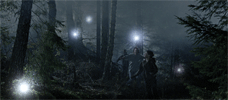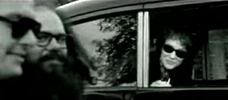Reviews
Terry George
USA, 2007
Credits
Review by Tom Huddleston
Posted on 21 November 2007
Source 20th Century Fox 35mm print
Categories The Times BFI 51st London Film Festival
In an earlier London Film Festival review, for Things We Lost In The Fire, I outlined a growing movement in American cinema which I dubbed ‘emo-porn,’ films which, like their sex- or horror-based counterparts, are made purely to provoke a single, powerful emotional or physical response in the viewer, in this case grief. These are films that exist solely to yank the heart strings, but not in a familiar, cosy Douglas Sirk sort of way: these are hard hitting, often brutal dramas of loss and despair, blueprints for existence in a cold, morally skewed post-9/11 world.
Where Things We Lost In The Fire took its cues from Monster’s Ball and 21 Grams, the bigger budget, star-driven end of the spectrum, Terry George’s new film Reservation Road harks back to an earlier but equally important key text in the emo-porn canon: Todd Field’s In The Bedroom. Revenge and vigilante stories are as old as time, but what these two films share is a desire to get to the root of suffering, to depict characters so overwhelmed by anguish that they are forced to act, even if they know it won’t make anything better. This, along with a complementary, familiar indie aesthetic, and some honest, unflinching central performances.
Reservation Road tells the story of two fathers: lawyer Dwight Arno, who only gets to see his son on weekends following a recent divorce, and lecturer Ethan Learner, a loving father utterly committed to his wife and two children. But on the way back from a baseball game Dwight hits Ethan’s son Josh with his car, killing him instantly. Terrified and only dimly aware of what he’s done, Dwight flees the scene. And even when he realises the extent of his crime he is unable to face it, and hastily covers his tracks, even agreeing to represent Ethan in his attempts to uncover the identity of the perpetrator. But gradually, in the course of their professional relationship, Ethan begins to suspect Dwight, leading him to commit a series of rash and dangerous acts.
Despite its comparatively lower budget, Reservation Road fulfils all the dramatic, aesthetic and narrative criteria demanded by the emo-porn movement. It centres on essentially middle class, white collar characters, ‘ordinary’ Americans struggling to cope with extreme situations. It focuses minutely on the everyday details of grieving, the struggle to keep a family together in the wake of tragedy, and the feelings of hopelessness, guilt and fury such an event can engender. And, perhaps most importantly, the film offers no solutions, leaving the characters just as conflicted and grief stricken as they were when the initiating event occurred, our only glimmer of hope coming in the form of grim, unwilling acceptance of the world and its myriad horrors.
Reservation Road is a bleak, unforgiving film. Shot in cold, wintry hues, shades of brown and grey, the film is unrelenting in its depiction of an icy, loveless world dominated by loss and guilt. As Ethan, Joaquin Phoenix is reserved and awkward, unable to confront the reality of what has happened to him and lashing out in unpredictable, impulsive ways. It’s a strong portrayal, like most in the film—stark and believable. Mark Ruffalo’s Dwight is perhaps the flashier performance, dealing as he is with more conflicted, dramatically satisfying emotions: guilt, self loathing and fear. Dwight is continually agitated, his eyes darting, his hands never still, constantly waiting for the seemingly inevitable unmasking. And his indecisiveness is beautifully handled, as he first decides to turn himself in, then backs off, then steels himself once more.
But the story these characters are involved in lacks the same level of intensity. The problem, perhaps, is one of familiarity: harsh though it may sound, we’ve seen grieving parent stories before, in movies and extensively on TV, in soaps and crime dramas: there’s nothing here to rival the power of, say, Sarah Palmer’s suffering in ‘Twin Peaks.’ We’re also too familiar with revenge narratives, and George fails to do anything interesting with his, giving us just a few scattered moments of dramatic tension and conflict to which we already know the inevitable outcome. Even the supporting characters - Jennifer Connelly’s desperate, helpless mother Grace, or her daughter Emma, played with quiet dignity by Elle Fanning - feel familiar, even uninteresting. Admittedly, these are supposed to be ‘normal’ people, but as characters onscreen they just feel a little too ordinary.
There are moments when it feels like Reservation Road is about to veer into new, more interesting territory. An early discussion between Ethan and his students hints at a fascinating subtext beneath the surface narrative, a treatise on the fact that modern Americans are shielded from pain, that an inability or unwillingness to face up to the cold realities of global suffering has left them weak and exposed, unable to cope with life’s inevitable tragedies. But this is never explored: Ethan’s search for justice leads him to lash out, but we never get a sense of him as a character numbed by modern living. Likewise Dwight’s decision to turn himself in, and his attempt to spend one last happy week with his son before facing a prison sentence. This could have been a rich emotional seam, adding warmth to the story in the form of a compelling father-son relationship while depicting the conflict Dwight feels between his love for his own son, and the cold fact of his crime against another, equally innocent child. But such issues are never fully explored, instead all we get is a brief montage of Dwight and the boy going to the fair, then watching a baseball game on TV. They’re laughing, but we never know what they’re laughing about: perhaps appropriately, the audience is kept out in the cold.
And this is the biggest problem with Reservation Road: it is an icy, brittle, humourless film which demands that its viewer either succumb to the story, feel these characters’ pain, or else switch off altogether. There is really nothing to it beyond the suffering, and one longs to feel something, anything else: a flicker of warmth, an instant of humour, a flash of excitement. But such moments, if they come at all, are too few and far between to make Reservation Road feel like anything other than a bleak, dispiriting and ultimately rather empty experience.
More The Times BFI 51st London Film Festival
-

Island of Lost Souls
2007 -

Garage
2007 -

Exodus
2007 -

Friends of Jesus
2007 -

We Want Roses Too
2007 -

The Trap
2006 -

Captain Ahab
2007 -

Shotgun Stories
2007 -

Savage Grace
2007 -

The Assassination of Jesse James by the Coward Robert Ford
2007 -

The World Unseen
2007 -

Things We Lost In The Fire
2007 -

Lions for Lambs
2007 -

Talk to Me
2007 -

Redacted
2007 -

Battle For Haditha
2007 -

Chaotic Ana
2007 -

Angel
2007 -

Juno
2007 -

Fay Grim
2006 -

Reservation Road
2007 -

I’m Not There
2007
We don’t do comments anymore, but you may contact us here or find us on Twitter or Facebook.



